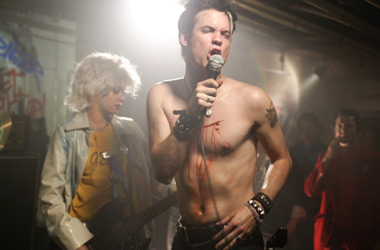Musings
an Online Journal of Sorts
By Alyce Wilson
April 14, 2008 - Cyber Punk

Vexille
On the second weekend of the 2008 Philadelphia Film Festival, we saw fewer films than the previous weekend, and a slightly different mix of genres.
Saturday, our first film wasn't until 2:30. After I dropped our dog, Una, at the pet sitter's, The Gryphon made us some delicious homemade blintzes with blueberry topping. Then we headed for our first film of the day, being shown at the Ritz Five theater in Old City.
As we were waiting for the movie to start, we learned some interesting
information from the guy sitting next to us, who happened to be a festival
volunteer. He told us that he'd attended the first showing of the new
Jackie Chan-Jet Li film, The Forbidden Kingdom, which opens nationally
next weekend. Because of concerns from the distribution company
over potential piracy (as the film's official open is not until next weekend),
festival staff had confiscated all electronic devices, including phones
and iPods. Many audience members were understandably irritated. We were
grateful for the information, though, and made plans to leave our phones
in the car when we saw the film on Sunday.
Vexille, a Japanese film directed by Fumihoko Sori, was a slick, computer-generated animated feature, using an innovative technique called cel shading, which resembles traditional, hand-drawn animation. Some portions looked more rendered, for a deliberately machine-like feel. The technique allowed the animators to provide a wider depth of field, with the ability to move different layers independently, something very difficult to achieve with traditional 2-D cel animation.
The only real limitation I found on the animation was that the characters lacked the range of expression found in traditional 2D animation. Some characters were naturally stoic, such as rebel leader Maria, so in her case, this lack wasn't as troubling. Lead character Vexille, however, a young Special Forces operative determined to achieve her mission, reacted to events with more emotional. Yet, her facial expressions didn't always reflect her words.
The story was set in the not-so-distant future of 2067. After international sanctions for violating worldwide guidelines for android development, Japan has been under self-imposed exile for 10 years. A U.S. Special Forces team gets sent to determine the cause of recent suspicious behavior by the Japanese.
While the film wrestles with age-old questions, such as the intersection between science and society, it also addresses new issues, such as the dangers of global economics and mega corporations. The plot is exposition-heavy towards the beginning but offers up several surprises, which I will leave for the viewer to discover. I noted a few logical flaws, primarily due to my understanding of technological limits, but many science fiction movies flout that line.
In general, I found the animation impressive and, as long as you're willing to suspend your disbelief, it's an enjoyable ride.
When the movie ended, it was about 4:30 p.m., so we opted for an early dinner, intending to make our way, at a leisurely pace, to our final film of the day, at 7 p.m. at The Prince Music Theater.
We wanted to eat at one of our favorite Indian restaurants, Karma, on the 100 block of Chestnut Street, but they weren't yet open for dinner, so we walked a little further and at at Kabul, an Afghan restaurant where we'd eaten once before. We were two of the first diners for the evening.
I ordered the salmon kebab, expecting it to be served on skewers, but instead, it was grilled and served in fillets, along with some grilled vegetables. I'd also ordered carrots and yogurt, instead of rice. The homemade yogurt was tangy and tasty, and the carrots with saffron sauce were tender and sweet, but the salmon was bland and a bit overcooked.
We walked across town to the Naked Chocolate Cafe, which we'd been planning on visiting for some time. As the name implies, Naked Chocolate offers a wide variety of hand-crafted artisinal chocolates and desserts. We both offered something small and traded bites.
I ordered a mini chocolate Belgian waffles, which was about a two-inch triangle of a layered confection, consisting of a crispy layer, a caramel layer, and chocolate, all covered with dark chocolate and sprinkled with chocolate and white chocolate chips. The Gryphon tried a rich layered bar, which contained lots of chocolate, caramel and nuts. It had a fun name, like Junk in the Trunk.
We took a seat at a table and talked while we nibbled on our delicacies, trading a few bites of the sweet goodness. As we looked around, we saw a lot of other items we'd like to try, such as chocolate mousse served out of a tall glass. We'll definitely be going back.

When we'd finished, we walked over to The Prince for our last movie of the day, What We Do Is Secret. Even though we were fairly early, there was already a huge line. After we got in line, they told everyone after us that they had to wait outside. The audience was skewed towards people in their '20s and '30s, including many punks.
At this showing, the Film Festival was awarding its Rising Star Award to Shane West, star of the film, whose credits also include a variety of feature films (The League of Extraordinary Gentlemen, A Walk to Remember) and roles on the TV series Once and Again and ER.
The festival chairman introduced Shane West with a poorly-paced clips reel put together by someone at TLA Films, which nevertheless did show a range of acting moments, from fight scenes, to romance, to drama, to musical performances.
When he accepted the award, dressed in a button-down light denim oxford with jeans and a long, pale-colored scarf, West stared down at the stage a lot, delivering a modest acceptance speech that concentrated more on his appreciation of Philly than about his career. Everything about his body language was closed in, almost shy, as if he doubted whether he deserved recognition. The audience, however, cheered him warmly. And after a brief introduction by the film's director, we watched the film.
West was definitely the emotional heart of this movie, as the late Darby Crash, the self-destructive punk legend who strong-armed his band, The Germs, to fame and infamy in the 1970s Los Angeles punk scene. Ranging from snarky to self-loathing, he evoked multiple dimensions of Darby's personality. In fact, The Germs liked his work on the film so much that they invited him to front the band on a recent reunion tour.
However, the film fell victim to numerous flaws, the most distracting of which was a terrible audio mix, which was muddy, at times making the dialogue virtually indecipherable. In fact, a club owner with a thick accent and a quirky way of speaking got subtitles, which started out as a reaction to a joke by another character: "He needed subtitles." It wasn't long before you found yourself wishing that everyone had them.
Writer/director Rodger Grossman tried unsuccessfully to blend a number of film genres, vacillating between tongue-in-cheek humor reminiscent of mockumentaries like This is Spinal Tap, to a more cut-and-dried VH1 Behind the Music-style rockumentary, to a biopic such as Sid and Nancy. The end result was a muddled mash-up of both funny and tragic moments. If you didn't know that it was based on a real person, you might confuse it for an implausible dramedy.
Interestingly, in the Q&A afterwards, Grossman revealed that the script was based on dozens of interviews he'd conducted with key players in the story. That might have influenced his structure of the script, with the emphasis on a fictionalized documentary.
Perhaps the director was a little too close to the subject and, since he knew Darby's story in intimate detail, didn't realize how confusing the structure might have been to others. For example, Darby was a huge Bowie fan, and when he made references to a Bowie song, I knew the significance of it. In speaking to some other viewers, those references sailed right over their head. For me, many references to the punk world were similar bewildering, although a friend more familiar with the punk scene said she was equally mystified.
Shane West, though, has shown that he has potential as an actor. Hopefully, before this film is widely distributed (a distribution deal is reportedly underway), Grossman will return to the studio and address the audio issues, so that audiences can truly appreciate West's performance.
More from
the 2008 Philadelphia Film Festival:
April 7, 2008 - The Art of Life
Moral:
Technical execution can make or break a movie.
Copyright
2008 by Alyce Wilson
What
do you think? Share your thoughts
at Alyce's message board (left button):
![]()
![]()

